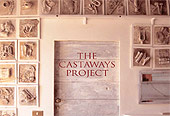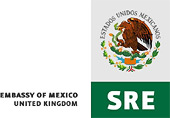© Antony Gormley's Waste Man commissioned by Artangel for Penny Woolcock's feature film Exodus
Public Debate: Anthropology on Television – Education or Entertainment?
Cosmo Rodewald Theatre, 19:00-21:00, Thursday 28 June
 The organizers are grateful to KEO Film for sponsorship of this Public Debate
The organizers are grateful to KEO Film for sponsorship of this Public Debate
Please note: although this Debate forms an integral part of the Festival, it is free and open to all members of the public.
Chair: Anna Ford, Co-Chancellor, University of Manchester
Convenor: André Singer, Filmmaker, West Park Pictures, London

Meet the Natives: Vanuatuans explore the United Kingdom for a new Channel 4 series produced by Keofilms. Reverse anthropology - or the neo-imperial gaze?
Panellists:
- Will Anderson, Series Producer of the new Meet the Natives series, Keofilms, London
- John Gledhill, Max Gluckman Professor of Anthropology, University of Manchester, Chair of the Association of Social Anthropologists
- Alan Macfarlane, Professor of Anthropological Science at the University of Cambridge
- Sam Organ, Executive Producer of the Tribe Series
Anthropology and television are currently sharing a public landscape, both in the UK and elsewhere, that they have not shared for more than a decade. Up until the early 1990s, there had been a relative abundance of series on UK television (Disappearing World, Under the Sun, Tribal Eye, Strangers Abroad, Face Values, etc.) that gave a popular audience access to programming that (at least to some degree) encouraged understanding and respect for the lives, institutions and activities of peoples hitherto regarded as alien and incomprehensible.
All that programming disappeared as the nature of UK television and its reception changed. But, now, after a number of years during which UK television has almost completely ignored anthropology, there is suddenly a plethora of programmes to which the label of 'anthropology' has been attached (Tribe, Return of the Tribe, Tales from the Jungle, Meet the Natives, etc.). These programmes have generated remarkably high audience ratings and positive critical reaction in the television industry: recently Tribe was nominated for the prestigious BAFTA award for best 'Factual Series'. Meanwhile, the BBC has just announced a major new series The Human Planet which, it appears, will draw to some degree on anthropological expertise.
For some, this rediscovery of interest in anthropology is long overdue and welcome; for others, it is anathema. Are these recent developments enabling us to continue sharing with the public the essentials of the discipline? Or has the priority given to entertainment on modern television had a retrogressive effect? Are these new programmes helpful or harmful, and to whom? Can they be considered 'anthropology' at all?
For anthropologists and film-makers alike, at least three criteria should be considered vital in judging whether the new landscape of television anthropology is a place of positive achievements or a step back to a long abandoned wilderness.
The first criterion must be our collective responsibility towards the people and subjects we observe, study and film – are there reliable ways of measuring the impact our intrusion is making on their current and future existence? Can the entertainment of one society, or even the education, be justified, if it risks damaging another?
The second criterion concerns the impact of this portrayal of others on the prime audience, the UK (and sometimes, international) public. Does this portrayal genuinely lead to a more sophisticated awareness of cultural difference, or does it merely pander to discredited and outdated, possibly even racist, stereotypes?
Related to this, there is a third criterion: the representation of the discipline of anthropology itself. Television has a (perhaps inevitable) bias to seek out the exotic over the familiar, but contemporary social anthropologists are as likely to be found studying urban processes and complex structures in industrial and post-industrial societies. Many may feel that the televison concentration on the exotic seriously distorts what anthropology is and does.
To debate these issues, André Singer, Chair of the RAI Film Committee, and both a well-known television producer and the holder of a doctorate in social anthropology, has invited two leading anthropologists with a particular sympathy for the role of film in anthropology and two leading producers of current 'anthropological' programming for UK television. The Debate will be chaired by Anna Ford, a well known television figure and once a student of anthropology at the University of Manchester. After initial exchanges between the panellists, contributions will be invited from the floor.
The Debate will involve the presentation of a number of short extracts from both current and future productions. Also, please note: that in preparation for the Debate, at 4-6pm on Thursday 28 June, in the Bragg Theatre, there will be a Special Screening of two examples of this recent 'anthropological' programming: Tales from the Jungle – Malinowski and the Trobriand Islanders, directed by Sophie Harris, and broadcast as part of Anthropology Week on BBC4 in January 2007, and Layap, directed by Gavin Searle for the Tribe series, shortly due to be broadcast on BBC2.
Profiles of the principal participants:
Anna Ford – Chair
 Well-known and much respected for her contribution to broadcast news and current affairs over more than 30 years, Anna was installed as the first woman Chancellor of the University of Manchester in 2001. Her links with the University stretch back to her student days when, as part of her Economics degree, she also studied social anthropology. She later became the first woman President of the Manchester University Student Union.
Well-known and much respected for her contribution to broadcast news and current affairs over more than 30 years, Anna was installed as the first woman Chancellor of the University of Manchester in 2001. Her links with the University stretch back to her student days when, as part of her Economics degree, she also studied social anthropology. She later became the first woman President of the Manchester University Student Union.
André Singer – Convenor
 Director of West Park Pictures and consultant to the Tribe series whilst also being Chair of the RAI Film Committee and Adjunct Research Professor of Anthropology at the University of Southern California in Los Angeles. After an anthropology doctorate at Oxford, based on work in Iran & Afghanistan, André joined Granada's Disappearing World, eventually becoming the series producer. Later, as a freelance, he made the Strangers Abroad and Forbidden Rites series whilst as a BBC Executive, he commissioned films from many anthropological filmmakers including David MacDougall, Jean Rouch, Melissa Llewellyn-Davies, and Dan Marks. He has been a long-time collaborator of Werner Herzog and produced his latest fantasy film, The Wild Blue Yonder.
Director of West Park Pictures and consultant to the Tribe series whilst also being Chair of the RAI Film Committee and Adjunct Research Professor of Anthropology at the University of Southern California in Los Angeles. After an anthropology doctorate at Oxford, based on work in Iran & Afghanistan, André joined Granada's Disappearing World, eventually becoming the series producer. Later, as a freelance, he made the Strangers Abroad and Forbidden Rites series whilst as a BBC Executive, he commissioned films from many anthropological filmmakers including David MacDougall, Jean Rouch, Melissa Llewellyn-Davies, and Dan Marks. He has been a long-time collaborator of Werner Herzog and produced his latest fantasy film, The Wild Blue Yonder.
Will Anderson
 Series producer, for Keofilms, of the Channel 4 series, which follows a group of Vanuatuans as they 'discover' the United Kingdom. Consisting of 3 x 1 hour films and provisionally entitled Meet the Natives, this series was originally pitched as an example of 'reverse anthropology'. Will has worked for Keofilms for 10 years. After acting as Assistant Producer on a number of films in the The Ends of the Earth series (including Jungle Trip, based on the work of Cambridge anthropologist Françoise Barbira with Amazonian healers in Peru) he developed and produced the first Going to Extremes series presented by Oxford University geographer Nick Middleton. In the third series, he took on directing, and was nominated for a BAFTA for Best New Director. Keofilms is currently shooting another series for Channel 4 on medical anthropology.
Series producer, for Keofilms, of the Channel 4 series, which follows a group of Vanuatuans as they 'discover' the United Kingdom. Consisting of 3 x 1 hour films and provisionally entitled Meet the Natives, this series was originally pitched as an example of 'reverse anthropology'. Will has worked for Keofilms for 10 years. After acting as Assistant Producer on a number of films in the The Ends of the Earth series (including Jungle Trip, based on the work of Cambridge anthropologist Françoise Barbira with Amazonian healers in Peru) he developed and produced the first Going to Extremes series presented by Oxford University geographer Nick Middleton. In the third series, he took on directing, and was nominated for a BAFTA for Best New Director. Keofilms is currently shooting another series for Channel 4 on medical anthropology.
John Gledhill
 Max Gluckman Professor of Social Anthropology at Manchester and Chair of the Association of Social Anthropologists (ASA). John’s work on politics and society in Latin America has ranged from the study of state power, social elites, and political violence to the everyday lives of the urban poor, international migrants, rural peasants and indigenous people. Amongst his many publications, his book, Power and Its Disguises has become a standard text in social anthropology. He uses photography and video in his fieldwork and while head of Manchester's Social Anthropology Department was a strong supporter of the Granada Centre for Visual Anthropology. The ASA itself will shortly be launching on-line delivery of short anthropological films from its website.
Max Gluckman Professor of Social Anthropology at Manchester and Chair of the Association of Social Anthropologists (ASA). John’s work on politics and society in Latin America has ranged from the study of state power, social elites, and political violence to the everyday lives of the urban poor, international migrants, rural peasants and indigenous people. Amongst his many publications, his book, Power and Its Disguises has become a standard text in social anthropology. He uses photography and video in his fieldwork and while head of Manchester's Social Anthropology Department was a strong supporter of the Granada Centre for Visual Anthropology. The ASA itself will shortly be launching on-line delivery of short anthropological films from its website.
Alan Macfarlane
 Professor of Anthropological Science at Cambridge, Fellow of King's College and the author of 17 published books, the most recent being based on a personal journey through Japan. Alan has a particular interest in Nepal and China but has also written about subjects closer to home, including Tudor & Stuart Witchcraft, and English ideas of Individualism. He was consultant to the BBC Domesday Project (multimedia videodisc) and the Channel 4 television series on Day the World Took Off. He has taught visual anthropology for many years and shot some 400 hours of film during fieldwork. He is a firm believer in importance of visual media in anthropology and recently put up 250 films on 'Youtube'.
Professor of Anthropological Science at Cambridge, Fellow of King's College and the author of 17 published books, the most recent being based on a personal journey through Japan. Alan has a particular interest in Nepal and China but has also written about subjects closer to home, including Tudor & Stuart Witchcraft, and English ideas of Individualism. He was consultant to the BBC Domesday Project (multimedia videodisc) and the Channel 4 television series on Day the World Took Off. He has taught visual anthropology for many years and shot some 400 hours of film during fieldwork. He is a firm believer in importance of visual media in anthropology and recently put up 250 films on 'Youtube'.
Sam Organ
 Freelance executive producer with Flashback Productions in Bristol since 2001, for whom the Tribe series is only one recent credit. Others include Avoiding Armageddon, a feature-length documentary about the Cold War, 55 Days: the Fall of Saigon for BBC2 and The Martians and Us, for the BBC's sci-fi series. Previously, Sam was Executive Producer at BBC Bristol for ten years and his many credits included history series, contemporary documentaries and arts programmes, including Shakespeare on the Estate which won the RTS Best Arts Documentary award. In the 1980s, he directed two of the first films about AIDS in the UK for the prestigious documentary strand 40 Minutes.
Freelance executive producer with Flashback Productions in Bristol since 2001, for whom the Tribe series is only one recent credit. Others include Avoiding Armageddon, a feature-length documentary about the Cold War, 55 Days: the Fall of Saigon for BBC2 and The Martians and Us, for the BBC's sci-fi series. Previously, Sam was Executive Producer at BBC Bristol for ten years and his many credits included history series, contemporary documentaries and arts programmes, including Shakespeare on the Estate which won the RTS Best Arts Documentary award. In the 1980s, he directed two of the first films about AIDS in the UK for the prestigious documentary strand 40 Minutes.

From the Making of an Englishman to the Last King of Scotland
Kevin MacDonald In Conversation
Opening Night - Wed 27 June

On Sunday 1st of July, the author Caryl Phillips will do a reading and take part in a lunchtime discussion with anthropologist Steven Feld and the artist Virginia Ryan, about their exhibition 'Castaways' which is being staged at the Whitworth art gallery. Read more









